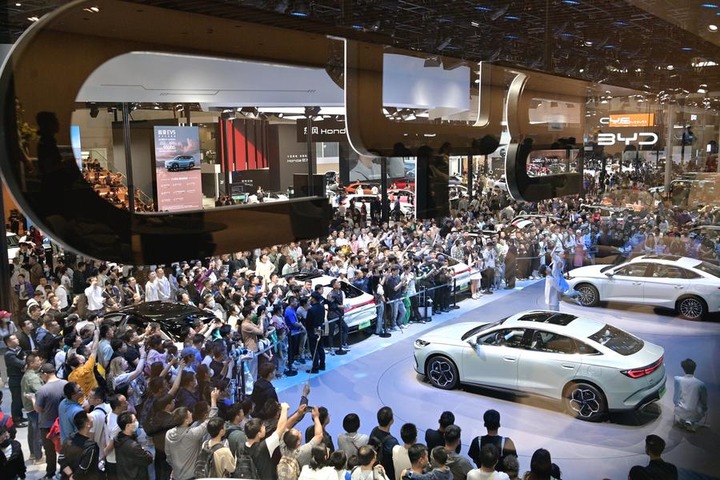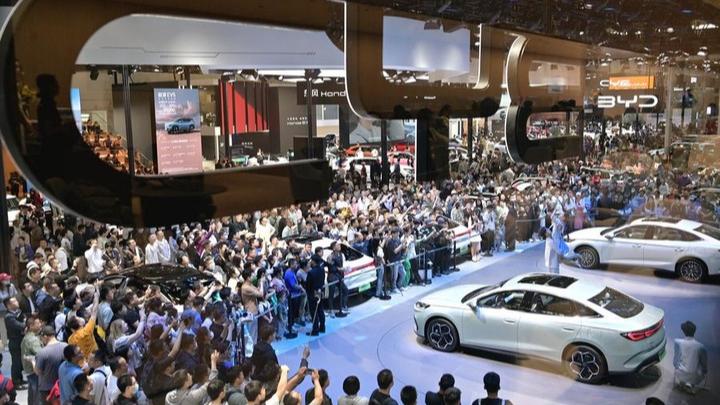
Visitors are seen at the exhibition area of Chinese NEV manufacturer BYD during the 2024 Beijing International Automotive Exhibition in Beijing, capital of China, May 4, 2024. (Xinhua/Yin Dongxun)
BEIJING, June 20 (Xinhua) -- China's new energy vehicle (NEV) sector has transformed from a follower to a leader over the past decade, injecting unprecedented development momentum into the country's automobile industry.
Growing from the scratch, the flourishing of China's NEV sector has become a successful case of optimizing the allocation of various development factors such as technology, talent and capital, and also a vivid portrayal of China's promotion of high-quality industrial development.
-- Quantitative change: numbers tell
Over the past ten years, China has introduced a series of policies and measures, including promoting purchase subsidies and accelerating construction of charging infrastructure, paving the way for the industry's development and the popularization of NEVs.
Efforts have also been made by Chinese car manufacturers in the same period. By increasing investment and sticking to independent innovation, a number of enterprises have achieved breakthroughs in key technologies such as batteries, motors and electronic controls.
From 2014 to 2023, the annual production and sales of China's NEVs have surged from 78,500 and 74,800 to 9.59 million and 9.5 million, an increase of about 126 times.
Survey shows that over 60 percent of consumers were considering purchasing NEVs in 2023, when global NEV sales reached 14.65 million, of which China's NEV sales accounts for 65 percent.
While getting more and more popular domestically, Chinese NEVs have been gaining increasing recognition in the global market as well. According to data from the China Association of Automobile Manufacturers (CAAM), China exported 1.2 million NEVs in 2023, a year-on-year increase of 77.6 percent.
What appear attractive to local residents about Chinese NEVs are not only the competitive prices, but the excellent technologies, according to a car dealer based in New Zealand.
-- Qualitative change: growing as a whole
With the advantage of global batteries industrial chains continuing to be prominent, the construction of charging infrastructure gradually improving, and new scenarios constantly expanding, China's NEV industry is being backed up with an increasingly complete support system.
Thanks to Chinese companies' continuous focus and investment in cutting-edge technologies, China has been a leader in terms of power battery industry market size for seven consecutive years.
The emergence of new technologies in the new energy field is leading to new demands, said Li Zhen, chairman and CEO of Gotion High-tech. In recent years, the Chinese battery maker has been continuously increasing its R&D investment, as a bid to improve core competitiveness by breaking through key technologies. In 2023, the company's R&D investment increased by 14.57 percent year on year.
Accompanying accelerated technological innovation, the development of China's NEV industry ecology has also been surging, with industrial clusters and cross-regional industrial chains formed in various regions including the Yangtze River Delta, the Pearl River Delta and the Beijing-Tianjin-Hebei region.
At the same time, sound charging infrastructures are inevitable for supporting high-quality development of NEVs. Nowadays, China's charging infrastructure network has covered most rural areas.
The automobile industry is witnessing accelerated integration of electrification, intelligence and networking, said Fu Bingfeng, CAAM's executive vice president and secretary-general, noting that a new industrial ecology is forming at an accelerated speed.
-- Transformation: smart for future
With China being the world's largest NEV market, Chinese automakers are sharing the development experience of China's NEVs with the world.
Recently, SAIC Motor unveiled its DMH super hybrid technology, achieving unified control of electric, mechanical, chemical and thermal energy, which is expected to further promote the popularization of NEVs.
In cooperating with Audi, SAIC will be sharing its software technologies including intelligent networking. In the future, with the help of the intelligent digital platform jointly developed by the two parties, the new product launch cycle is expected to be shortened by more than 30 percent.
German automaker Volkswagen Group has announced to work with Chinese electric vehicle maker XPENG to jointly develop the China Electrical Architecture (CEA), a zonal Electrical/Electronic (E/E) architecture, where XPENG's leading technology will play a vital role.
Through ten years of development, China's NEV sector has grown to be sparkling at the global stage. In the future, the country will continue to accumulate experience in promoting NEV development and share its green benefits with the world. (Edited by Yu Huichen with Xinhua Silk Road, yuhuichen@xinhua.org)




 A single purchase
A single purchase









